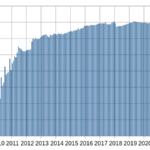Nvidia’s secret to success lies in its robust software ecosystem that keeps competitors at bay.
- Nvidia’s dominance in AI is attributed to its combination of hardware and software, creating a ‘walled garden’ for developers.
- The CUDA software platform has been pivotal in enabling diverse applications on Nvidia’s GPUs, including AI.
- Nvidia has more software engineers than hardware engineers, emphasizing its focus on software development.
- Despite competition, Nvidia is expected to maintain a 90% market share in AI-related chips for the next few years.
- Tech giants like Google and Amazon are developing their own chips to compete with Nvidia, but face challenges in switching.
Nvidia, led by CEO Jensen Huang, is renowned for its AI chips, but its true strength lies in a business strategy that combines both software and hardware. Over the last two decades, Nvidia has built a ‘walled garden’ similar to Apple’s, but focused on developers creating AI systems. This strategy has positioned Nvidia to retain a significant share of the AI market despite increasing competition from other chip manufacturers and tech giants like Google and Amazon.nnAt the heart of Nvidia’s success is its CUDA software platform, launched in 2007, which allows non-graphics applications to run on its specialized chips. This innovation has enabled a wide range of computing tasks, including AI, to be performed efficiently on Nvidia’s graphics-processing units (GPUs). The company has continually expanded its software offerings, now boasting over 300 code libraries and 600 AI models, which are utilized by millions of developers across thousands of companies.nnNvidia’s commitment to ‘full-stack computing’ means it develops both the hardware and the software necessary for AI, giving it a competitive edge that rivals struggle to overcome. While companies like AMD are investing heavily in software development to catch up, Nvidia’s established ecosystem makes it challenging for customers to switch to alternative systems.nnThe AI chip market is projected to reach $400 billion annually by 2027, prompting various companies to collaborate on open-source alternatives to CUDA. However, Nvidia is expected to maintain a dominant market share of around 90% in the coming years. Startups like NinjaTech AI have faced difficulties in using alternative chips, highlighting the cost advantages of Nvidia’s offerings despite their high prices.nnAs competition intensifies, Nvidia is aware of the pressure to reduce costs and has promised that its next generation of AI chips will be more affordable. For now, Nvidia’s stronghold in the AI market appears secure, driven by the inertia of its established software ecosystem.·
Factuality Level: 7
Factuality Justification: The article provides a detailed analysis of Nvidia’s market position and its software platform CUDA, supported by relevant data and expert opinions. However, it contains some bias in favor of Nvidia and lacks a critical perspective on the challenges it faces, which affects its overall objectivity.·
Noise Level: 8
Noise Justification: The article provides a detailed analysis of Nvidia’s competitive position in the AI chip market, discussing its software platform CUDA and the implications of its walled garden strategy. It includes relevant data, examples, and insights into the competitive landscape, while holding Nvidia accountable for its pricing strategies. The article stays on topic and supports its claims with evidence, making it a thoughtful and informative piece.·
Public Companies: Nvidia (NVDA), Intel (INTC), AMD (AMD), Amazon (AMZN), Google (GOOGL), Microsoft (MSFT), Meta Platforms (META), Apple (AAPL)
Private Companies: OpenAI,Groq,NinjaTech AI,Silo AI
Key People: Jensen Huang (CEO of Nvidia), Atif Malik (Semiconductor and Networking Equipment Analyst at Citi Research), Bill Pearson (Vice President at Intel), Andrew Dieckman (Vice President at AMD), Babak Pahlavan (CEO of NinjaTech AI), Gadi Hutt (Executive at Amazon Web Services)
Financial Relevance: Yes
Financial Markets Impacted: The article discusses Nvidia’s dominance in the AI chip market and the competitive landscape, which directly impacts financial markets and companies involved in AI technology and semiconductor manufacturing.
Financial Rating Justification: The article focuses on Nvidia’s business strategies, market share, and competition, all of which are crucial financial topics that affect investors and the stock market.·
Presence Of Extreme Event: No
Nature Of Extreme Event: No
Impact Rating Of The Extreme Event: No
Extreme Rating Justification: The article discusses Nvidia’s business strategies and market position but does not mention any extreme events occurring in the last 48 hours.·
Deal Size: 640000000
Move Size: No market move size mentioned.
Sector: Technology
Direction: Neutral
Magnitude: Medium
Affected Instruments: Stocks
 www.wsj.com
www.wsj.com 





